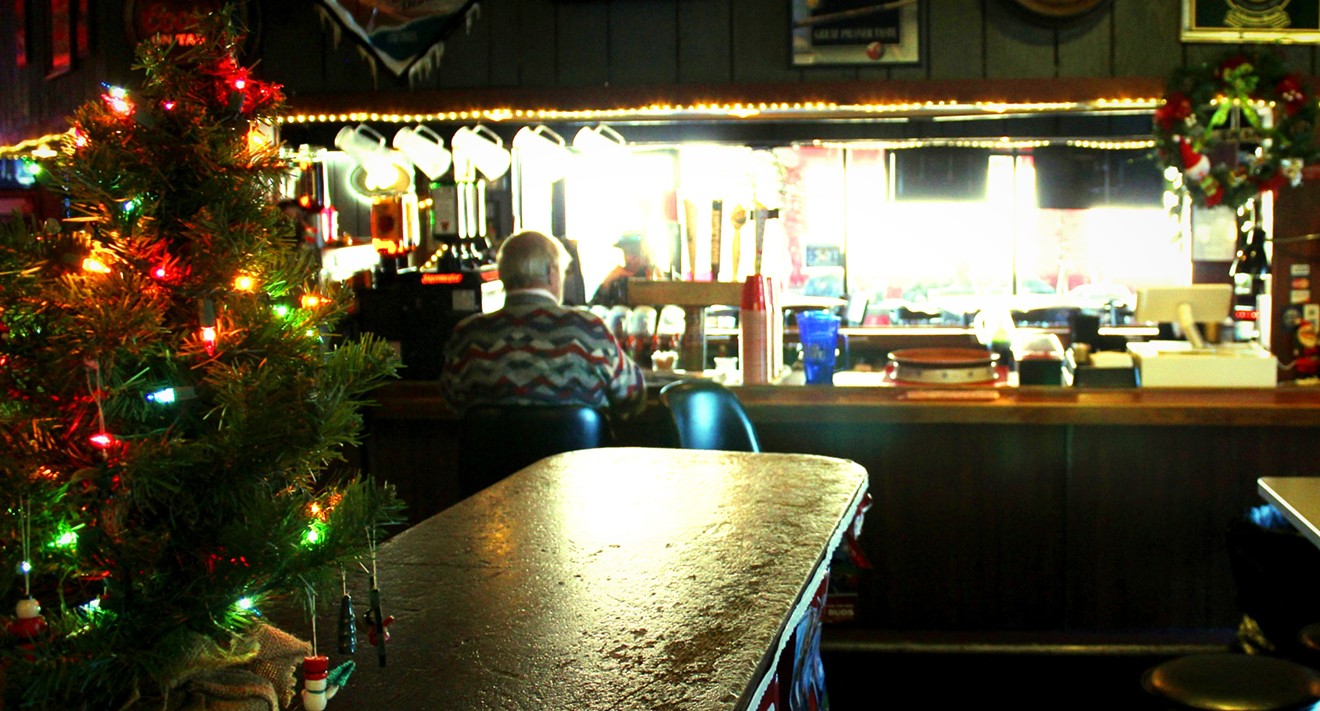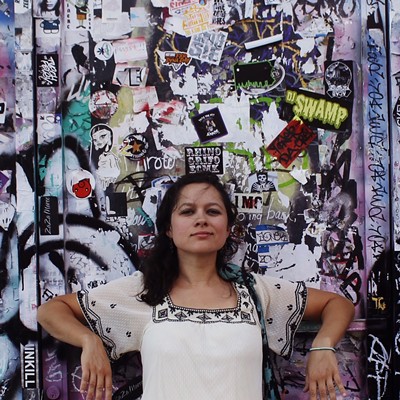Why are 23 major music corporations suing a 42-year-old bar in Aurora?
According to a federal lawsuit filed on December 11, the infamous Sand Creek Lounge held unauthorized public performances of songs owned by Broadcast Music Inc. (BMI), Hydroponic Music, Sony/ATV and others.
The lawsuit only describes the offenses as “unauthorized public performance of musical compositions" and a BMI spokesperson declined to elaborate, saying, "The establishment offers karaoke two-to-four times a week as well as recorded music, DJ sets and dancing.”
Legal documents list sixteen infringing performances that were held on August 13 and 14, 2016. Offending tunes range from Bo Diddley's "My Story" and "Get Down Tonight," by KC and the Sunshine Band, to Michael Jackson's "Smooth Criminal" and Elton John's "Tiny Dancer."
"Karaoke night — that's a killer night," says Tracy Clemons, a Sand Creek Lounge bartender of five years.
BMI says it contacted bar owner Richard Engel fifty times starting in February 2015, “by phone, mail, and email, in an effort to educate defendants as to their obligations under Copyright Act with respect to the necessity of purchasing a license for the public performance of musical compositions in the BMI Repertoire.”
Engel declined to comment on the specifics of the claim.
Ed's Hurricane Lounge in Tulsa, Oklahoma, was slapped with a similar lawsuit in November. Owner Ed Reincke says he ignored twenty warnings from BMI because "the jukebox is supposed to pay all the royalties. We just blew them off because we didn't take them seriously."
"It's impacted me financially, because I had to hire a lawyer," says Reincke. "It's not going to shut me down. We've been here 34 years. I'll sing to them if I have to."
BMI has hit at least nineteen Centennial State saloons with copyright lawsuits since 2003, including Boulder's Outback Saloon in 2012.
"That BMI stuff? They were just trying to get their money," says Outback Saloon general manager Matt Wolvington.
Court documents show that Outback Saloon initially requested a jury trial. Then three weeks after BMI filed a motion for summary judgment with a $40,000 fine, the bar settled the matter out of court.
Other bars weren't so lucky. The Carey-On Saloon in Colorado Springs went out of business in 2014 when it was hit with a $21,000 fine. Carey-On Saloon subscribed to the American Society of Composers, Authors and Publishers (ASCAP) and Society of European Stage Authors and Composers (SESAC) but not BMI, and unfortunately for the bar, several patrons sang Toby Keith songs while a BMI scout was present.
Located at 16893 East Iliff Avenue in Aurora, the Sand Creek Lounge is a neighborhood saloon, a bar frequented by folks from all walks of life, starting at 9 a.m. with the breakfast crowd who come to watch The Price Is Right; then City Hall officials come in to unwind at the end of the day.
Sand Creek currently pays the American Society of Composers, Authors and Publishers around $500 annually to license music from their stable of 680,000 artists. ASCAP famously played a role in the 1917 Supreme Court case Herbert v. Shanley Co., which first established that businesses performing music must compensate composers regardless of whether admission is charged.
In the case, the Vanderbilt Hotel was found to have unlawfully hired an orchestra to play "From Maine to Oregon" in the dining room. Justice Oliver Wendell Holmes wrote, "If the rights under the copyright are infringed only by a performance where money is taken at the door, they are very imperfectly protected. Performances not different in kind from those of the defendants could be given that might compete with and even destroy the success of the monopoly that the law intends the plaintiffs to have."
BMI's license grants copyright clearance to publicly play more than fourteen million musical works by 900,000 songwriters, composers and publishers. BMI licenses starts at $378 per year but can cost more depending on the square footage of the venue and how often music is performed.
"Our approach is to educate business owners about the value that music brings to their establishment, the requirements of copyright law, and the importance of maintaining a music license,” says Caroline Gumer, senior communications associate with BMI. “After several attempts have been made to reach the business owner through phone calls and letters, an in-person visit might occur.”
Founder of the scrappy DIY music space Seventh Circle Music Collective Aaron Saye says BMI contacted him shortly after he took over the garage venue — previously run under the name Blast-O-Mat — in 2012.
“We learned specifically that a friend's similar DIY venue in Portland, Oregon, had been slapped with a $5,000 fine for playing a CD by Rush in between bands at a show,” Saye says referring to Laughing Horse Books, which closed after 29 years in 2014. “They fought the fine and won, simply due to their lack of knowledge of this unfamiliar aspect of the music industry, but instead of opting to pay the dues to all three companies, they opted to hang a giant ‘NO COVERS’ sign above their stage, and they also made a point to only play independent, non-copyrighted music over their sound system in between bands.”
“In the end, we decided it was more worthwhile for us to just go ahead and pay these organizations their dues each year,” Saye says. Every year, Seventh Circle Music Collective shells out more than $3,000 to BMI, ASCAP and SESAC — a huge sum for an all-volunteer-run collective, but Saye says that’s the cost to “be free to allow our bands to play whatever they want. It's much less stressful than the prospect of having to hide the venue more underground and nervously worry that there might be a BMI scout in the room.”
BMI takes a dime on every dollar and distributes 90 percent of profits to the songwriters, composers and publishers.
“There are thousands of unknown songwriters who write the hits that you hear on the radio, and the money that BMI collects from licensing fees helps them pay their bills so they can keep creating the music that we all enjoy,” says Gummer. “All songwriters are entitled to be fairly compensated for their work.”
It isn't clear how well versed artists themselves are in copyright law. Since 2016, Denver-based folk-rock band the Lumineers have been listed as plaintiffs on eight lawsuits for unauthorized performances of their hit song "Ho Hey," from the Fine Line Music Cafe in Minneapolis, Minnesota, to the Swannsborough Yacht Club in Swansboro, North Carolina.
Jim Merlis, who represents the band through Big Hassle Media, could not comment on the Lumineers' position, but said artists often don't learn about publisher business disputes until after the fact.
Others question whether this system is outdated.
“I feel conflicted with it, personally," Saye says, "If a band covers a Metallica song at our venue one night, I know Metallica aren't necessarily directly getting the fraction of a fraction of a cent that is due to them for that public performance of their copyrighted work. I feel like it's a good system in theory to ensure that artists who copyright their music don't get taken advantage of, but I feel that it's a system that was built before there were literally millions of independent bands and thousands of independent venues.”
As for BMI, it's just doing its job.
"We never want to see the music shut down, but if our licensing efforts are unsuccessful, we might take legal action,” Gumer says. “At the end of the day, it is BMI’s job to protect its songwriters and make sure they are compensated if their music is performed in a public setting.”
At this point, closing isn't even a question for the Sand Creek Lounge.
"If I closed now, I would be taking a piece of Aurora out," Engel says. "It certainly would be throwing a lot of good people out of work. I think I have as much loyalty to my staff and my customers to reciprocate what they've given me."
[
{
"name": "Air - MediumRectangle - Inline Content - Mobile Display Size",
"component": "12017618",
"insertPoint": "2",
"requiredCountToDisplay": "2"
},{
"name": "Editor Picks",
"component": "17242653",
"insertPoint": "4",
"requiredCountToDisplay": "1"
},{
"name": "Inline Links",
"component": "18838239",
"insertPoint": "8th",
"startingPoint": 8,
"requiredCountToDisplay": "7",
"maxInsertions": 25
},{
"name": "Air - MediumRectangle - Combo - Inline Content",
"component": "17261320",
"insertPoint": "8th",
"startingPoint": 8,
"requiredCountToDisplay": "7",
"maxInsertions": 25
},{
"name": "Inline Links",
"component": "18838239",
"insertPoint": "8th",
"startingPoint": 12,
"requiredCountToDisplay": "11",
"maxInsertions": 25
},{
"name": "Air - Leaderboard Tower - Combo - Inline Content",
"component": "17261321",
"insertPoint": "8th",
"startingPoint": 12,
"requiredCountToDisplay": "11",
"maxInsertions": 25
}
]













